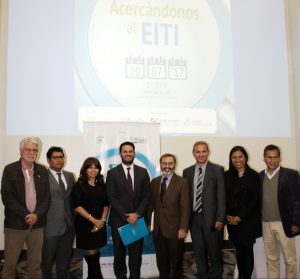Lima, August 1, 2017.- «Transparency is not an end in itself, but should improve accountability and combat corruption», said Jonas Moberg, head of the international secretariat of the Extractive Industries Transparency Initiative (EITI) during the public event «Bringing us closer to EITI». EITI brings together governments, companies and civil society from 52 countries, with the aim of promoting governance in the extractive sector.
Incidents such as Lava Jato and Panama Papers mark the global trend fighting against corruption and mismanagement. Supporting economic growth that offers confidence to citizens is the best option for any investment. To this end, transparency and access to information with participation and intercultural approach should be effective public policies in our country.
Jonas Moberg considered that now is the right time to create mechanisms to make use of information that has been made transparent for the benefit of citizens. Another challenge will be the implementation of the required standard on «beneficial ownership» of extractive companies in the upcoming EITI reports. «Beneficial owners are the ones that sustain companies. There is an ambition to ensure that one gets to know who the owners behind the companies are».
César Gamboa, executive director of Derecho, Ambiente y Recursos Naturales (DAR) and alternate member in EITI´s international Board representing civil society, mentioned that the transparency is a cross-cutting issue for the State and is necessary to prevent corruption and to improve the management. «Without transparency, there is no confidence and incidents such as Lava Jato in the region highlight the need of trust between citizens, companies and states.»
Progress of the initiative
Peru has been member of this initiative since 2005 whereby the Government commits to transparency. Rolf Perez of the technical secretariat of EITI Peru, falling under the responsibility of the Ministry of Energy and Mining, said that the conciliation report covering the fiscal years 2015-2016 will be finalized this year.
He also added that continuing to strengthen the regional EITI Commissions is on this year´s agenda. The regional EITI Commission in Arequipa has been added to the list of already functioning regional Commissions in Piura and Moquegua and progress is also being made in Apurimac.
Next steps
According to Eduardo Rubio, Member of the EITI Peru National Commission representing the private sector, one of the pending tasks is to process information in more detail in order to identify specifically how the money coming from extractive activities is being invested. He also noted that this type of tripartite initiatives (between the State, business and civil society) could be replicated in other sectors, such as fisheries and infrastructure.
Epifanio Baca of the Grupo Propuesta Ciudadana, alternate member of the EITI Peru National Commission representing civil society, noted that the effective automatization of EITI reports is still an issue to be addressed. «If these studies provide information in relation to the previous fiscal year in July at the latest, when the canon is being distributed, that would be most useful.»
Both César Gamboa and Epifanio Baca stated that the main challenge for civil society in EITI is environmental transparency. Gamboa added that this request is not limited to Peru, but also is extended to all Latin America and the Caribbean.
Public transparency mechanisms

Finally, the actions undertaken by the National Service for Environmental Certification for Sustainable Investments (SENACE) and by the Agency for Environmental Assessment and Enforcement (OEFA) were presented in relation to transparency and access to environmental information. Patrick Wieland, head of SENACE, presented the Platform for Environmental Certification (repository of the EIA, technical opinions, baselines, modifications, technical reports), its Open Data Portal and their steps towards ISO 37001 (ISO anti-corruption).
Tessy Torres, President of the Executive Council of OEFA, said that OEFA is working on early assessments in crucial stages of the processes, such as the permit for exploration to exploitation, where there are greater impacts, in order to encourage the participation of the population and to prevent conflicts. In addition, she noted that OEFA achieved 93.76% in the user satisfaction index for access to information.
This event was held in the framework of the visit to Peru of Jonas Moberg. It was organized on 20 July by the EITI civil society group, led by Derecho, Ambiente, Recursos Naturales (DAR) and Grupo Propuesta Ciudadana with the support of Open Society Foundations and the Ford Foundation.
Photos and source: DAR.
Disponible en español.
